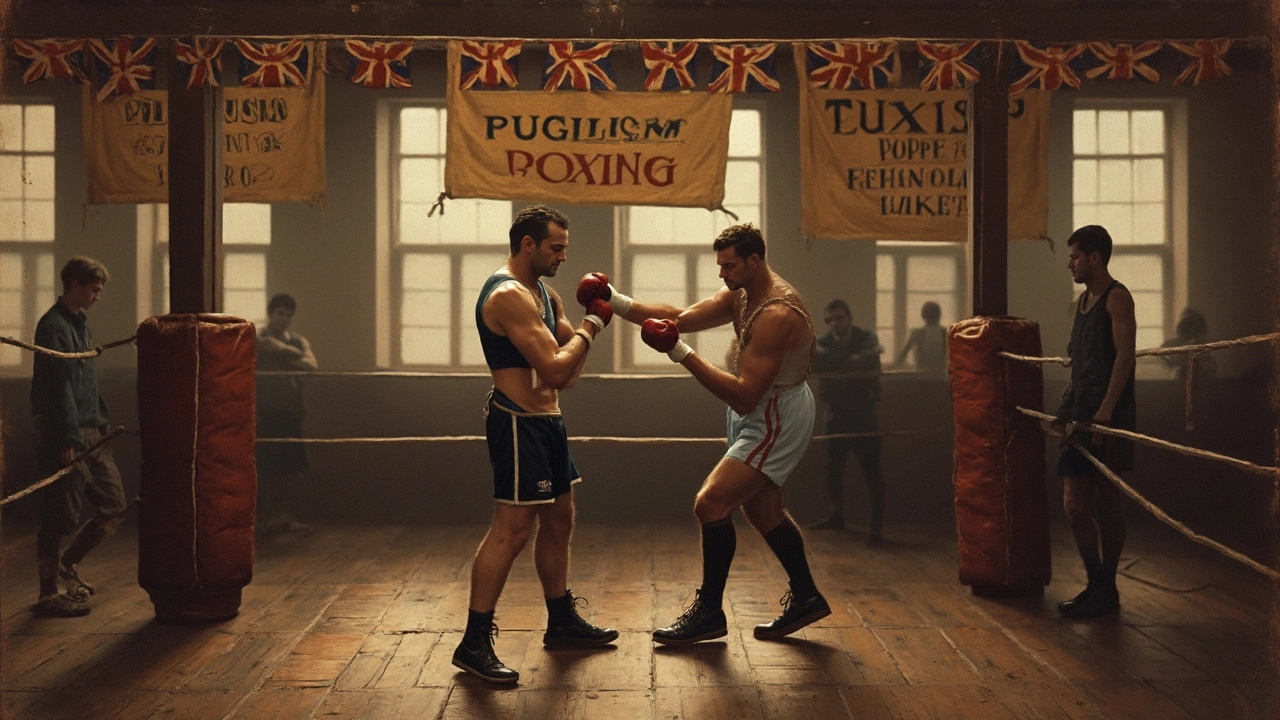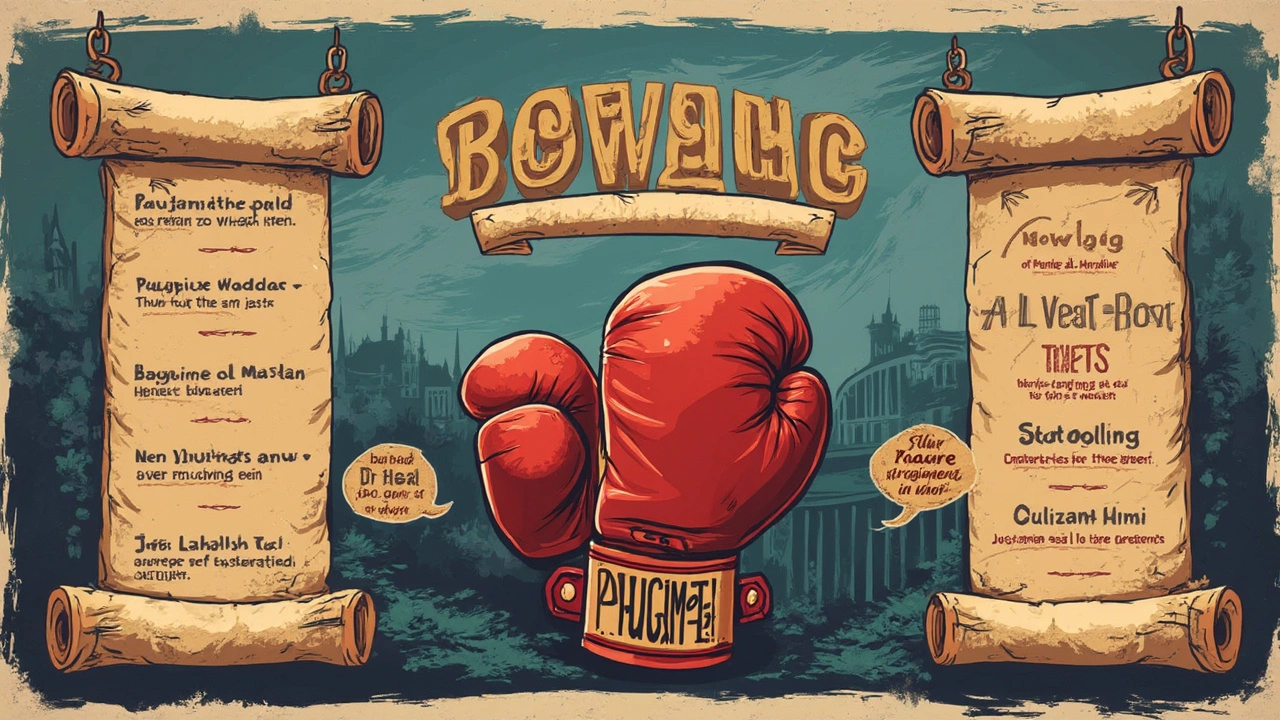
People throw around different names for boxing, but which one is right? Everyone knows about 'boxing,' but you might've heard folks drop words like 'pugilism' or even 'the sweet science.' If you're confused, you're not alone. The sport goes waaay back, and with that much history, names tend to pile up.
For most of us, it's just 'boxing.' No frills, no fancy vocabulary. If you walk into any gym, you'll hear coaches and fighters use it nonstop—'boxing drills,' 'boxing shoes,' 'boxing matches.' It's direct and everyone gets it. But if you dig around in old newspaper clippings or chat with die-hard fans, 'pugilism' pops up, echoing from when fighters were still battling bare-knuckle in smoky saloons.
- Common Names for Boxing
- The Original Term: Pugilism
- Boxing Around the World
- Formal and Official Names
- Why the Name Matters
- When to Use Each Term
Common Names for Boxing
The sport is almost always called boxing these days, especially in the ring or on TV. It's what you'll see splashed across posters, gym doors, and every pay-per-view fight night. Anyone searching for clubs or matches plugs in 'boxing' because it's the universal label. That's the main name, but by no means the only one.
Dive into history books or old-school fight talk, and you'll bump into 'pugilism.' That’s the vintage label for the sport. It comes from Latin, and old fighters and writers loved to toss it around. Today, you'll mostly hear it from hardcore fans, sports commentators wanting to sound old-timey, or when reading about the sport's early days (especially pre-1900s). There's also 'prizefighting,' which zeroes in on boxing matches where money's on the line. 'The sweet science' is another—this one’s more of a nickname, nodding to the technique and strategy of the sport rather than brute force.
Here’s a quick table to see how these names line up with history and usage:
| Name | When Used | Who Uses It |
|---|---|---|
| Boxing | Now, everyday | Everyone – gyms, fans, commentators |
| Pugilism | Mainly 18th-19th century, or retro talk | Historians, classic writers, old-school fans |
| Prizefighting | When talking about paid matches | Journalists, promoters, fans into the business side |
| The Sweet Science | As a nickname | Writers, commentators, fans who love the sport's tactics |
Different names stick for different reasons—some for tradition, some for clarity, and some just because they sound cool. But if you say 'boxing,' nobody’s going to correct you. That’s the one that always lands.
The Original Term: Pugilism
You ever hear someone drop the word "pugilism" and wonder why it sounds so old school? That's because it is. Pugilism was the go-to name for boxing back before our great-grandparents were born.
The word "pugilism" comes straight from the Latin “pugil,” which means a boxer or someone who fights with their fists. It started popping up in English back in the 1700s. Back then, fighters squared up bare-knuckle—yep, no gloves, just wraps or nothing at all. Rules were basic: stand up and swing until someone couldn’t keep going.
Writers loved the word "pugilism" because it sounded scientific and serious. If you flip through a late 19th-century sports page, you’ll see it all over the place. Famous historian Kasia Boddy puts it simply:
"In the age before modern gloves and scorecards, 'pugilism' wasn't just what you called the sport. It gave the fight an air of class and tradition."
Some folks still use the term when they want to sound fancy or nostalgic—or maybe just to impress their friends. But for most people today, "pugilism" is like using "automobile" instead of "car." It’s correct, sure, but it feels a little out of place at the gym.
If you run into "pugilist," that’s the old word for a boxer. Think of it like sports trivia—cool to know, but you probably won’t hear it outside of trivia night, old books, or when someone’s really trying to flex their vocab.
Boxing Around the World
What you call boxing can actually change depending on where you are. In the US and UK, people stick to just calling it 'boxing.' Easy, right? But step outside those countries and things start to shift a bit.
Check out Mexico. There, it’s just as popular, but folks often say 'boxeo.' The sport has blown up with massive fights and legendary champs like Canelo Alvarez, and fans usually use Spanish slang to hype the matches. Japan and the Philippines also eat, sleep, and breathe the sport, but you'll hear it called 'bokushingu' in Japan and just 'boksing' in Filipino. It’s the same deal, just the native twist on the name.
Sometimes people mix up Western boxing with traditional fighting styles from other countries. Thailand has Muay Thai—totally different but sometimes called 'Thai boxing' by tourists. Bare-knuckle boxing is still around in places like the UK, and in Russia, there's 'fist fighting' (Kulachniy boy), which has deep historical roots but is very much its own thing.
Pro events are big worldwide, and local culture puts its stamp on every part. In Cuba, boxing schools are almost everywhere and the sport feels like a national treasure. Even in Africa, you'll find boxing gyms in places like Nigeria and South Africa, where the local leagues are giving more kids a shot at glory.
So, if you’re traveling or following fights from other countries, keep an eye on what people actually call the sport. It might sound a little different, but the action in the ring is a language everyone gets.

Formal and Official Names
If you look at official docs, sports websites, or any event listings, you'll see that the boxing is usually the go-to name. For example, the International Boxing Association (IBA) and USA Boxing are both main organizers for amateur and Olympic boxing events. Their rules, events, and rankings all use the word 'boxing' front and center.
There’s not really a more “official” name today, at least in English. In Olympic settings, it's formally called 'Boxing' and nothing else. If you’re checking out the schedule for the Summer Games, you’ll spot the event listed simply as 'Boxing.'
Once in a while, especially in the UK or old-school contexts, you’ll see 'Amateur Boxing' for the Olympic side, and 'Professional Boxing' when it’s about fighters paid per match. That’s the formal separation: amateur is for up-and-comers, while pros get paid to fight on bigger stages.
Here’s a quick look at some key organizations and what they call the sport:
- International Boxing Association (IBA) – formerly AIBA
- World Boxing Association (WBA)
- World Boxing Council (WBC)
- International Boxing Federation (IBF)
- World Boxing Organization (WBO)
- USA Boxing
Read official event paperwork, legal contracts, or even medical reports—'boxing' is the word you'll find. 'Pugilism' is more for history buffs or retro discussions.
| Organization | Term Used |
|---|---|
| International Boxing Association | Boxing |
| USA Boxing | Boxing |
| World Boxing Association | Professional Boxing |
| Olympic Games | Boxing |
If you’re filling out forms or joining a club, just write ‘boxing.’ Anything else comes off as trying a bit too hard or missing the mark on what the sport is actually called now. For anything official, ‘boxing’ wins—hands down.
Why the Name Matters
The way we talk about boxing isn't just about sounding cool—using the right term can totally change how people understand what you mean. If you type 'boxing' into YouTube or Instagram, you're going to pull up highlight reels, training tips, and pay-per-view mega fights. But if you search for 'pugilism,' you’ll mostly hit on history lessons or old-school rulebooks. The name sets the vibe.
It also matters when you’re talking to certain crowds. Boxing promoters and organizations stick to the word 'boxing' because it’s clear and instantly familiar—think big fights like the heavyweight showdown at Madison Square Garden. On the flip side, if you’re chatting with old coaches or reading about the sport in books from the 1800s, 'pugilism' is their thing. It’s a small detail that can make you sound like you really know your stuff—or, if you get it wrong, like you’re out of the loop.
You can spot the differences more easily in official documents, too. For example, Olympic and pro sports organizations always go with 'boxing' for rules, safety, and official rankings. Here’s a quick look at some names and their typical use:
| Name Used | Common Setting |
|---|---|
| boxing | Mainstream, modern, and in every gym or event |
| pugilism | History books, documentaries, academic talks |
| the sweet science | Commentary, journalism, enthusiast lingo |
The term you choose can also dodge confusion, especially if you're talking to someone who knows other combat sports. 'Boxing' leaves zero question you're not talking about MMA, kickboxing, or anything with elbows and knees. Respecting the right term helps you get respect back—no one wants to look like a rookie when debating Mayweather or Pacquiao records at a bar.
When to Use Each Term
If you’re talking about the sport today, just say boxing. It keeps things simple, and almost everyone knows what you mean—whether you’re at a gym, watching a match, or chatting about the weekend’s big fight. The word covers amateur, professional, and Olympic matches. TV commentators, journalists, and promoters all use it because it’s straightforward.
Now, if you’re writing an article, book, or maybe even a school essay about boxing history, ‘pugilism’ works when you’re focusing on the sport’s early days. That’s how people referred to the sport back in the 18th and 19th centuries, especially in the UK and the U.S. It works well if you want to sound a bit more scholarly or dig into the classic roots. But don’t use it in casual conversation—most people will just stare at you.
Sometimes you’ll hear or read ‘the sweet science,’ mostly from commentators or fans who really love the technical side. This one comes from an 1813 article by sportswriter Pierce Egan. It hints at the skill, strategy, and brain power involved. Save ‘the sweet science’ for blog posts, podcasts, or when you’re trying to impress someone who’s deep into fight analysis.
Different countries use their own terms. For example, in Mexico and Spain, you’ll hear ‘boxeo.’ In France, it’s ‘boxe anglaise’ when talking about English-style boxing.
| Term | When to Use | Audience Reaction |
|---|---|---|
| Boxing | Everyday talk, all levels | Clear and familiar |
| Pugilism | Historical writing, old-timey feel | Makes you sound informed (or just old school) |
| The Sweet Science | Editorials, analysis, fancy discussions | Sounds passionate, maybe poetic |
| Boxeo, Boxe Anglaise | Talking in/with other countries | Shows respect, fits local culture |
If you’re ever unsure, just stick with ‘boxing.’ If you’re trying to impress a fight historian or dig into the roots, throw in ‘pugilism’ now and then. Want to sound like a superfan? Call it ‘the sweet science’ when sharing your hot takes on strategy and technique.